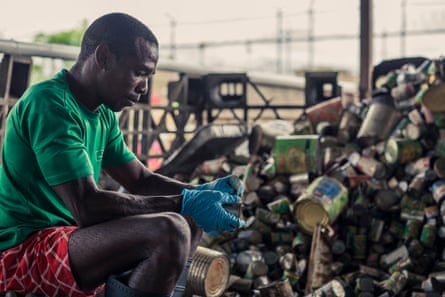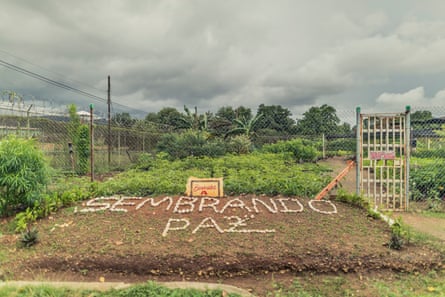La Joyita prison, just outside Panama City, was notorious for being filthy, overcrowded and dangerous. It was known as the “stomach of the beast” for those confined within its walls. “We literally lived on top of rubbish,” says Franklin Ayón.
“It was everywhere – in the corners, in the corridors,” says Ayón, who was imprisoned for drug trafficking in 2012. “We had to sit with a towel over our head to eat, just so the flies wouldn’t land on the food.”
Ayón, an agronomist by profession, came up with a plan. In 2014, he designed a recycling scheme that he named EcoSólidos: prisoners at La Joyita, one of the country’s largest prisons, would collect, separate, recycle and sell waste. And their work would earn them reduced sentences.
The prison authorities were keen, and the usually warring gang leaders also supported the idea, agreeing a peace deal to allow the project to go ahead.

The project at the prison proved a success. Ten years on, 500 prisoners are now involved, says Eliécer González, head of treatment and rehabilitation in Panama’s prisons.
About 80% of the prison’s waste is now recycled. Plastic and aluminium are sold, while food waste is turned into compost for the prison’s gardens, where fruit and vegetables are grown.
A nursery was created, which donates 1,500 tree seedlings a year to a reforestation scheme run by Panama’s environment ministry.
EcoSólidos opened the way to other opportunities for people in prison to study or work, says González. “This helps us a lot and is a benefit for society,” he says.
The rate of reoffending and returning to prison has dropped from 65% to 45% since 2019. And not one prisoner who has taken part in EcoSólidos has reoffended.
The scheme has been replicated in four other prisons in Panama, González says, and the authorities in Honduras, Paraguay, El Salvador, Peru, Colombia and Nicaragua have shown interest in replicating the scheme.
“This gives us satisfaction,” he says. “We thought we were having a national impact but it turns out that internationally, countries are interested in what we are doing.”
after newsletter promotion




In 2016, Ayón was granted a presidential pardon for his work and, on his release, he extended EcoSólidos to a nonprofit organisation, GeoAzul, employing former inmates who collect waste in Panama City and turn it into compost. It now processes more than 10 tonnes of waste a day.
People work for GeoAzul for an average of six months, earning a monthly salary and gaining a reference, which makes it easier to go on to other jobs. According to Ayón, about 500 people have passed through the company, which he says has saved the prison system about $1.2m as the majority of people GeoAzul employs do not re-offend.
According to the International Committee of the Red Cross (ICRC), which started supporting EcoSólidos in 2016, tensions between prisoners were eased because of the cleaner environment.
Morale also improved as participants saw their work helped the environment. Instead of just passing the time however they could, the prisoners became productive, benefiting from working in a team and spending time outside.




William Morillo, 30, was convicted for drug trafficking and is finishing his sentence working for GeoAzul after starting in the prison with EcoSólidos. “It was a success for me,” he says.
“I passed my time being busy. I wasn’t locked up all the time and the work was fun. It fills me with pride.”
Ayón has seen the transformation in Morillo. “He’s changed a lot,” says Ayón. “He’s punctual and always here when he says he’s going to be.”
There are countless other stories of successfully rehabilitated ex-prisoners now leading normal lives after working on the recycling scheme, from a young man implicated in a double murder to an ex-police officer who shot his wife’s lover.
“There’s something really wonderful about receiving rubbish that you know won’t end up going to waste, and protecting and caring for the environment,” says Ayón.
This post was originally published on this site be sure to check out more of their content.






